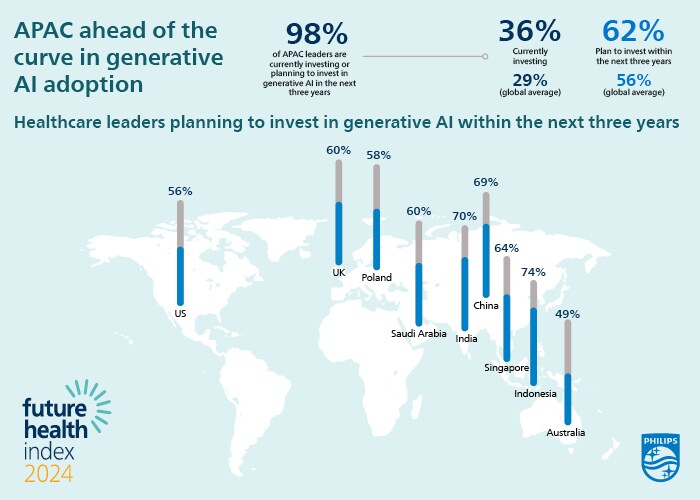AI and data integration solutions to improve quality and timeliness of patient care Today, healthcare is simply not working as it needs to and health systems are facing challenges to deliver accessible, high-quality care to patients. The newly released Philips Future Health Index (FHI) 2024 report highlights that half (50%) of healthcare leaders in APAC are seeing increased burnout, stress, mental health issues, deteriorating work-life balance and low morale among healthcare staff. About 3 out of 4 (71%) are concerned about staff shortages resulting in delays in care for patients. Furthermore, 92% of healthcare leaders in APAC highlight that financial challenges are impacting their organization’s ability to provide timely, high quality-care, with 59% of them currently improving operational efficiency at their organization as a financial strategy. Other countries are doing the same, including Singapore (64%), Indonesia (57%), and Australia (56%). A systemic change in healthcare is much needed to overcome these challenges and ensure healthcare remain sustainable in the future. The FHI report, which surveyed nearly 3,000 healthcare leaders in 14 countries, including Australia, Singapore and Indonesia in Asia Pacific, shows that healthcare leaders are focusing on improving operational efficiencies through workflow prioritization, data integration, and AI-enabled innovation to improve patient care.
“While long wait times and staff shortages are making it difficult for people to get the care they need, when they need, we are also observing our healthcare leaders taking bold and thoughtful changes to deliver better patient care for more people,” says Dr Mark Burby, Vice President of Health Systems for Philips APAC. “They are determined to overcome data integration challenges to fully uncover its utmost potential and are excited to embrace the next level of AI implementation for critical decision making and improved efficiencies.”
While long wait times and staff shortages are making it difficult for people to get the care they need, when they need, we are also observing our healthcare leaders taking bold and thoughtful changes to deliver better patient care for more people.
Dr Mark Burby
Vice President of Health Systems, APAC, Philips
High hopes in the potential of data integration to improve efficiency and care
The understanding and support for innovative technology being used to support healthcare workers holds true for the industry. Healthcare leaders in APAC have high hopes for data integration to improve efficiency and care. Optimizing treatment plans or care pathways, identifying evidence-based best practices and forecasting and managing patient demand are the top benefits expected from having data-driven insights.
Underlying challenges must first be overcome before healthcare organizations can fully harness the power of data. In APAC, a majority of healthcare leaders (93%) reported having experienced at least one data integration challenge. Healthcare leaders believe data integration challenges will affect healthcare organizations’ ability to provide timely and high-quality care as they bring about an increased risk of errors, reduced patient safety and/or quality of care (36%). Limited coordination between care providers/departments (33%) and increased operational costs due to inefficiencies (32%).
Two thirds (67%) of healthcare leaders also highlighted the importance of quality data to fully uncover the benefits of data integration. Both global and APAC respondents state improved accuracy of data and data security or privacy as the top aspects that need to be changed when it comes to the management of healthcare data. Overcoming data integration challenges allows for greater accuracy and efficiency, so that patients can receive more timely and high-quality care.

Increasing focus on AI and generative AI
In APAC, almost all (98%) of respondents are currently investing in (36%) or plan to invest (within the next three years)in generative AI technologies (62%). The region’s interest in generative AI is ahead of global healthcare leaders currently investing (29%) and planning to invest in the next three years (56%). Healthcare leaders are keenly interested and open to incorporating generative AI technologies in their healthcare organizations to benefit patient care and unlock new efficiencies.

Despite the general excitement about AI’s possibilities and role in healthcare, a majority (95%) of healthcare leaders in APAC expressed concerns about data bias in AI applications widening disparities in health outcomes. There is a shared recognition that AI needs to be implemented in a responsible way to avoid unintended consequences. Making AI more transparent and interpretable for healthcare professionals (45%), ensuring staff diversity in data and AI (43%), continuous training and education in AI (40%), and implementing policies for the ethical use of data and AI (39%) were listed as strategies to mitigate the risk of data bias. This can only be achieved through cross-sector collaboration and coalition-building.
“The future of delivering better care for more people is attainable through seamless integration of data and smart application of AI in clinical care to improve workflow and productivity for healthcare providers. At Philips, we are leveraging AI and informatics capabilities and harnessing the power of partnerships to innovate across imaging, interventional and monitoring to stay ahead of these needs,” added Dr Burby.
For details on the Future Health Index methodology and to access the full Future Health Index 2024 report, visit Future Health Index | Philips.
Share on social media
Topics
Contact

Jane Yeo Head of Communications & Brand, APAC
You are about to visit a Philips global content page
Continue











